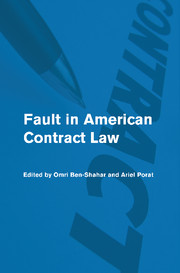Book contents
- Frontmatter
- Contents
- List of Contributors
- Preface
- Acknowledgment
- I THE CASE FOR STRICT LIABILITY
- II THE CASE FOR FAULT
- III BETWEEN STRICT LIABILITY AND FAULT
- 7 Fault at the Contract-Tort Interface
- 8 The Many Faces of Fault in Contract Law: Or How to Do Economics Right, Without Really Trying
- 9 The Productive Tension Between Official and Unofficial Stories of Fault in Contract Law
- IV WILLFUL BREACH
- V COMPARATIVE FAULT
- VI THE MORALITY OF BREACH
- Case Index
- Subject Index
- References
7 - Fault at the Contract-Tort Interface
Published online by Cambridge University Press: 10 November 2010
- Frontmatter
- Contents
- List of Contributors
- Preface
- Acknowledgment
- I THE CASE FOR STRICT LIABILITY
- II THE CASE FOR FAULT
- III BETWEEN STRICT LIABILITY AND FAULT
- 7 Fault at the Contract-Tort Interface
- 8 The Many Faces of Fault in Contract Law: Or How to Do Economics Right, Without Really Trying
- 9 The Productive Tension Between Official and Unofficial Stories of Fault in Contract Law
- IV WILLFUL BREACH
- V COMPARATIVE FAULT
- VI THE MORALITY OF BREACH
- Case Index
- Subject Index
- References
Summary
The formative period in the history of contract and tort may be characterized by the cleavage of contract and tort around the concept of fault: tort modernized by moving from strict liability to a regime of “no liability without fault,” while contract moved toward strict liability. Nineteenth-century scholars of private law offered explanations for the opposition, reasoning that alternative ideas about fault account for the different character of state involvement in enforcing private law rights: Tort law governs liabilities imposed by law on nonconsenting members of society (and thus, it should limit itself to fault-based conduct), while contract law governs bargained-for duties and liabilities of parties who exercise freedom of contract (and thus, liability voluntarily undertaken need not consider fault). It is argued in this chapter, that these theories are problematic, especially because they cannot offer a complete account of contract or tort. Tort retains too much strict liability to be thought of as a regime of no liability without fault, and contract has too many fault-based rules to be conceived of through strict liability. While these justifications for the distinction between contract and tort were questioned in ensuing generations, they still structure much of the debate over the current boundary between contract and tort.
Introduction
Despite a number of notable exceptions, the concept of fault has not been central to contemporary contracts scholarship. I would like to suggest that this is no simple oversight.
Information
- Type
- Chapter
- Information
- Fault in American Contract Law , pp. 101 - 117Publisher: Cambridge University PressPrint publication year: 2010
